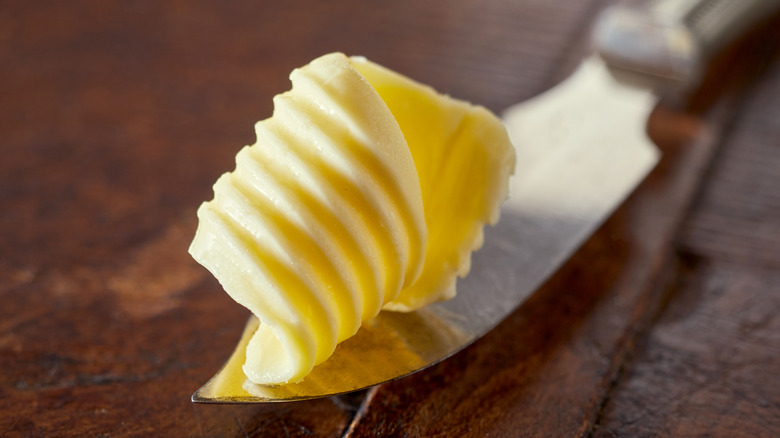Why Alton Brown Recommends Bakers Splurge On Butter
As Julia Child herself once said, per Kitchn, "With enough butter, anything is good." But, when it comes to low-quality butter, adding more can actually be a bad thing. If you've ever spread a fancy European butter across a slab of crusty bread, you know the difference it can make for elevating a simple dish. But, that next-level flavor doesn't come without a hefty price tag: At a Whole Foods in Brooklyn, New York, 16 ounces of generic unsalted butter goes for $4.19, while 8.8 ounces of English-made Goats Butter will set you back $11.29.
When it comes to baking, is forking over an extra $3 or $4 for a single ingredient worth it? Melting an entire stick of pricey butter into your chocolate chip cookie dough might not make a lot of sense, says Huffpost, but what about in baked goods where butter really shines, like pie crusts and croissants?
Alton Brown served a long tenure as a fountain of cooking tips for home chefs. The thrifty chef has even created a menagerie of DIY-mechanisms to avoid spending money on kitchen appliances (including a pepper grinder attached to a power drill) — and he says that pricey butter is worth the extra cost.
Low-quality butter has more water, says Alton Brown
In his "Precise Advice" segment on "The Late Show With Stephen Colbert," Alton Brown explains the reason behind the fancy butter hype. Since many recipes call for unsalted butter to factor in added salt content, says Brown, the same should be true when it comes to water content. But it isn't. According to the chef/food scientist, cheaper butter brands contain more water than expensive brands (up to 12% water content), which can affect the turnout of baked goods. Your textural results will be unpredictable at best, and at worst, unsalvageable.
Milkfat (aka butterfat; According to Land O'Lakes, the terms refer to the same thing) makes a big difference in the quality of your butter. Per federal regulations set forth by the USDA, all butter sold in the U.S. must contain at least 80% milkfat. But, some pricier European butter brands boast as much as 82% to 87% milkfat, reports Huffpost. But why does it matter? According to chef Maury Rubin, higher butterfat is correlated with lower moisture content, which is especially important for delicate baked goods like eclairs or napoleons.
In addition to texture, splurging on fancy butter can also upgrade your baked goods' flavors. Grace Bryan of Washington's Vista Bakeshop knows this and swears by it. "Butter from a local farm or nicer European brands has a lot more pronounced flavor and will marry well with whatever you're going to put it on," explains Bryan, via Saveur.

